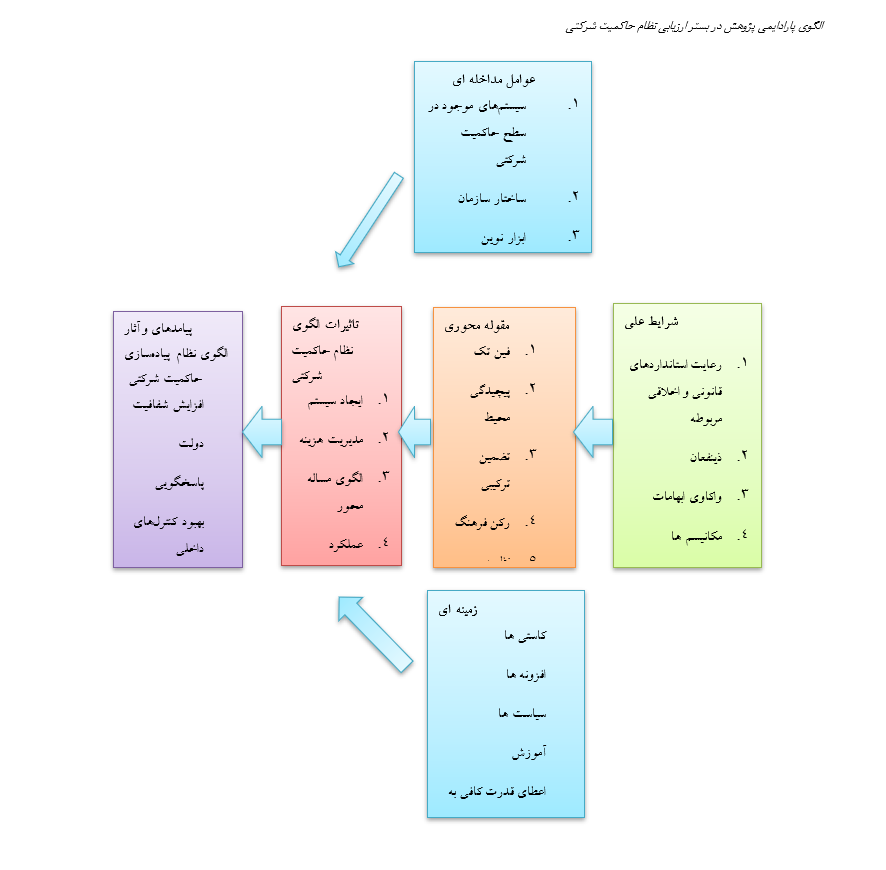واکاوی ارزیابی اثربخشی نظام حاکمیت شرکتی در ایران مبتنی بر رویکرد داده بنیاد
کلمات کلیدی:
نظام حاکمیت شرکتی, ارزیابی اثربخشی, رویکرد داده بنیاد, فین تکچکیده
تحقیقات نظام حاکمیت شرکتی عمدتاً بر ورودیهای حاکمیت مؤثر متمرکز است، با این حال ما اطلاعات کمی در مورد نحوه نظارت و ارزیابی سیستمهای حاکمیتی شرکتها بهطور مداوم داریم. هدف این مقاله واکاوی ارزیابی اثربخشی نظام حاکمیت شرکتی در ایران مبتنی بر رویکرد داده بنیاد است. جامعه آماری این تحقیق شامل 11نفر صاحبنظر از خبرگان دانشگاهی و آشنا با موضوع مباحث حاکمیت شرکتی بود که با روش گلوله برفی انتخاب شدند و از مصاحبه برای گردآوری دادههای مورد نیاز استفاده گردید. مصاحبه این پژوهش با بهرهگیری از چارچوب CAR طراحی و به روش کیفی و رویکرد داده بنیاد تحلیل شدند. تحلیل دادهها با کدگذاری باز، محوری و انتخابی انجام شد و سرانجام به ارائه مدل نهایی شامل شش بعد اصلی و سی و دو بعد فرعی انجامید. نتایج نشان میدهد که الگوی ارزیابی اثربخشی نظام حاکمیت شرکتی در ایران حول مقوله محوری فین تک و نظارت قرار دارد که تحت تأثیر شرایط علی شکل میگیرد. این فرآیند با شرایط علی آغاز میگردد و موجب شکلگیری مقوله محوری میشود که با استفاده از راهبردها به افزایش شفافیت، پاسخگویی، بهبود کنترلهای داخلی، خلاقیت و بهینهسازی منابع کمک میکنند.
دانلودها
مراجع
Aguilera, R. V., Judge, W. Q., & Terjesen, S. A. (2018). Corporate governance deviance. Academy of Management Review, 43(1), 87-109. https://doi.org/10.5465/amr.2014.0394
Anderson, D. W., Melanson, S. J., & Maly, J. (2007). The evolution of corporate governance: Power redistribution brings boards to life. Corporate Governance: An International Review, 15(5), 780-797. https://doi.org/10.1111/j.1467-8683.2007.00608.x
Areneke, G., Adegbite, E., Tunyi, A., & Hussain, T. (2023). Female directorship and ethical corporate governance disclosure practices in highly patriarchal contexts. Journal of Business Research, 164. https://doi.org/10.1016/j.jbusres.2023.114028
Awais Amin, Q., & Cumming, D. J. (2023). Regulatory Reforms, board independence and earnings quality. Journal of International Financial Markets, Institution & Money, 88. https://doi.org/10.1016/j.intfin.2023.101840
Bai, C., Lu, J., & Tao, Z. (2006). The multitask theory of state enterprise reform: empirical evidence from China. The American economic review, 96, 353-357. https://doi.org/10.1257/000282806777212125
Bao, S. R., & Lewellyn, K. B. (2017). Ownership structure and earnings management in emerging markets-An institutionalized agency perspective. International Business Review, 26(5), 828-838. https://www.sciencedirect.com/science/article/abs/pii/S0969593117300999
Benton, R. A., & You, J. (2019). Governance monitors or market rebels? Heterogeneity in shareholder activism. Strategic Organization, 17(3), 281-310. https://doi.org/10.1177/1476127018776482
Chari, M. D., David, P., Duru, A., & Zhao, Y. (2019). Bowman's risk-return paradox: An agency theory perspective. Journal of Business Research, 95, 357-375. https://doi.org/10.1016/j.jbusres.2018.08.010
Chen, C. C.-h., Guo, R.-J., & Lin, L. Y.-H. (2023). The effect of political influence on corporate valuation: Evidence from party-building reform in China. International Review of Law and Economics, 73, 106120. https://doi.org/10.1016/j.irle.2022.106120
Clarke, D. (2016). Blowback: how China's efforts to bring private-sector standards into the public sector backfired. Is regulating the visible hand? In B. L. Liebman & C. J. Milhaupt (Eds.), The Institutional Implications of Chinese State Capitalism (pp. 29-47). Oxford University Press. https://doi.org/10.1093/acprof:oso/9780190250256.003.0002
Decaux, L., & Sarens, G. (2015). Implementing combined assurance: insights from multiple case studies. Managerial Auditing Journal, 30(1), 56-79. https://doi.org/10.1108/MAJ-08-2014-1074
Fenwick, M., McCahery, J. A., & Vermeulen, E. P. M. (2019). The End of "Corporate" Governance: Hello "Platform" Governance. European Business Organization Law Review, 20(1), 171-199. https://doi.org/10.1007/s40804-019-00137-z
Filatotchev, I., & Boyd, B. K. (2009). Taking stock of corporate governance research while looking to the future: Guest editorial. Corporate Governance: An International Review, 17(3), 257-265. https://doi.org/10.1111/j.1467-8683.2009.00748.x
Filatotchev, I., & Nakajima, C. (2014). Corporate governance, responsible managerial behavior, and corporate social responsibility: Organizational efficiency versus organizational legitimacy? Academy of Management Perspectives, 28(3), 289-306. https://doi.org/10.5465/amp.2014.0014
The Impact of Corporate Governance and Stakeholder Engagement on Organizational Resilience in Kuwaiti Islamic Financial Institutions. (2024). Rjfa. https://doi.org/10.7176/rjfa/15-3-05
Kovermann, J., & Velte, P. (2019). The impact of corporate governance on corporate tax avoidance-A literature review. Journal of International Accounting, Auditing and Taxation, 36, 100270. https://www.sciencedirect.com/science/article/pii/S1061951818301071
Lumineau, F., Wang, W., & Schilke, O. (2021). Blockchain Governance - A New Way of Organizing Collaborations? Organization Science, 32(2), 500-521. https://doi.org/10.1287/orsc.2020.1379
Mahmudi, B. (2024). Corporate Governance Mechanisms and Financial Performance: A Systematic Literature Review in Emerging Markets. Productivity, 1(3), 270-285. https://doi.org/10.62207/gqtv4c76
Ni Luh Putu Agustin Nirmala, S. (2024). Does Good Corporate Governance and Political Connection Have an Influence a Tax Avoidance? Formosa Journal of Multidisciplinary Research, 3(3), 253-262. https://doi.org/10.55927/fjmr.v3i3.8584
Oktaviani, R. M. (2023). The Impact of Corporate Governance and Fiscal Loss Compensation on Tax Avoidance Policies: Indonesian Banking Sector. International Journal of Sustainable Development and Planning, 18(11), 3641-3647. https://doi.org/10.18280/ijsdp.181130
Samans, R., & Nelson, J. (2022). Corporate Governance and Oversight. In Sustainable Enterprise Value Creation. Palgrave Macmillan. https://doi.org/10.1007/978-3-030-93560-3
Sands, A. (2019). Bots in the Boardroom: The Promise of AI.
Siddiqui, F., YuSheng, K., & Tajeddini, K. (2023). The role of corporate governance and reputation in the disclosure of corporate social responsibility and firm performance. Heliyon, 9(5). https://doi.org/10.1016/j.heliyon.2023.e16055
Thoan, L. T. (2024). Corporate Governance in Listed Firms: Does Market Competition Make a Difference? Asian Academy of Management Journal, 29(1), 171-203. https://doi.org/10.21315/aamj2024.29.1.7
Till, R. E., & Yount, M. B. (2019). Governance and Incentives: Is It Really All about the Money? Journal of Business Ethics, 159(3), 605-618. https://doi.org/10.1007/s10551-018-3778-5
Wau, M. (2023). Financial Risk, Corporate Governance, and Financial Performance: An Empirical Study on Bank Indonesia. Jurnal Akuntansi Keuangan Dan Bisnis, 16(2), 179-188. https://doi.org/10.35143/jakb.v16i2.6139
Wu, Z., Lin, S., Chen, T., Luo, C., & Xu, H. (2023). Does Effective Corporate Governance Mitigate the Negative Effect of ESG Controversies on Firm Value? Economic Analysis and Policy. https://www.sciencedirect.com/science/article/pii/S0313592623002990
Zhu, J. J., Caleb, H. T., & Li, X. (2019). Unfolding China's state-owned corporate empires and mitigating agency hazards: Effects of foreign investments and innovativeness. Journal of World Business, 54(3), 191-212. https://www.sciencedirect.com/science/article/pii/S1090951617306715

دانلود
چاپ شده
ارسال
بازنگری
پذیرش
شماره
نوع مقاله
مجوز
حق نشر 2025 Zohreh Fahimnejad, Massoud Gholamzade Ledari, Hashem Nikomaram, Ghodratollah Talebnia (Author)

این پروژه تحت مجوز بین المللی Creative Commons Attribution-NonCommercial 4.0 می باشد.










